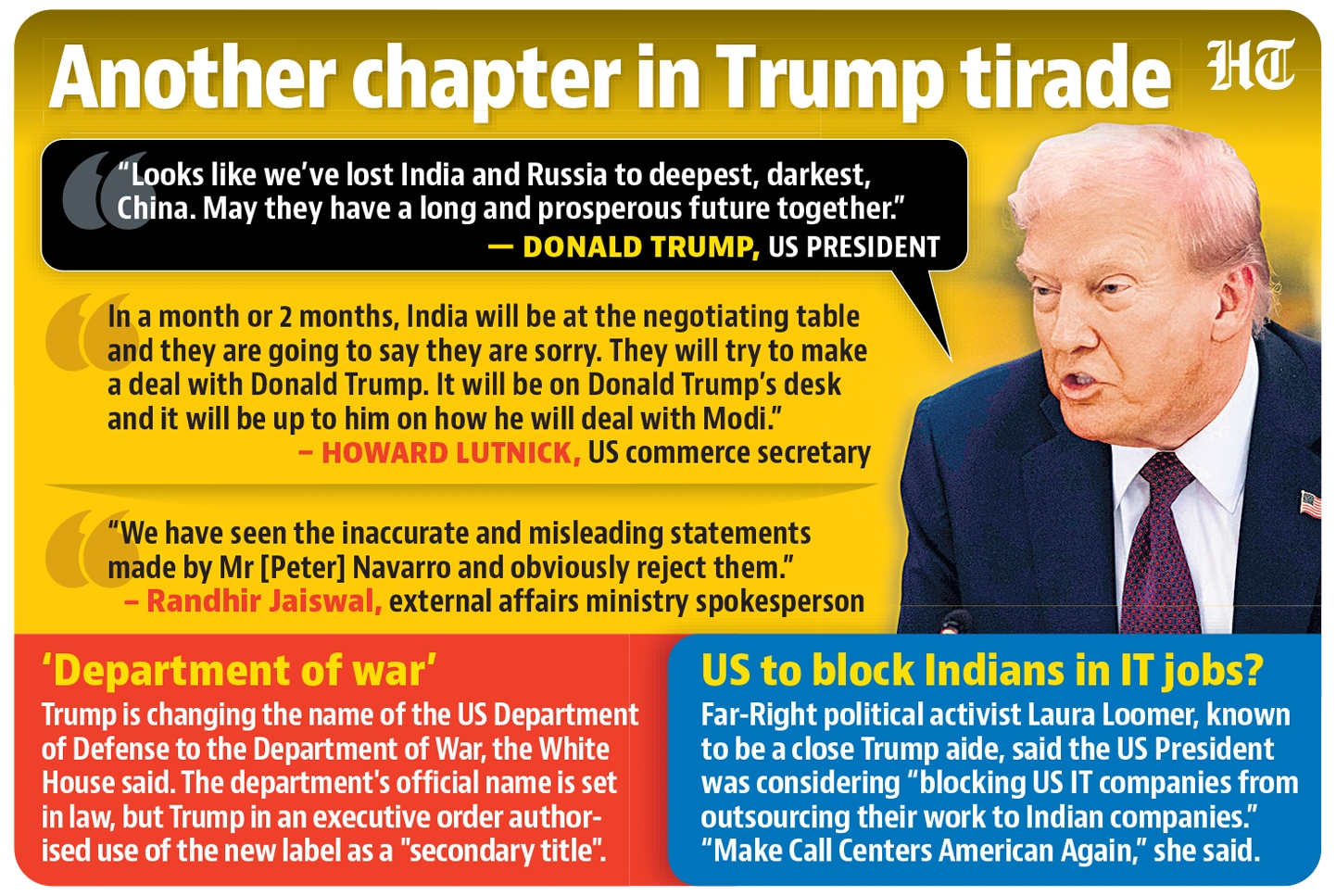We’ve lost India, Russia to ‘deep, dark’ China: Donald Trump
US President Donald Trump’s stance was backed by a senior White House commerce official who called on India to “decide which side they want to be on”.
US President Donald Trump declared that America had “lost” India and Russia to China in a social media post on Friday, days after Prime Minister Narendra Modi’s participation in a Shanghai Cooperation Organisation summit that featured prominent visuals with Chinese President Xi Jinping and Russian President Vladimir Putin.

Trump’s stance, the latest in an increasingly hostile attitude towards ally New Delhi, was backed by a senior White House commerce official who called on India to “decide which side they want to be on”.
“Looks like we’ve lost India and Russia to deepest, darkest, China. May they have a long and prosperous future together,” Trump wrote, as critics argued that his administration’s 50% tariffs on New Delhi had pushed the country towards Moscow and Beijing.
In New Delhi, foreign minister spokesperson Randhir Jaiswal, said the government had “no comments” when asked to react to Trump’s post.

Back in Washington, commerce secretary Howard Lutnick criticised New Delhi’s unwillingness to open markets to US exports, stop Russian energy purchases, and withdraw from Brics.
“India doesn’t yet want to open their market, stop buying Russian oil and stop being a part of Brics. They are the vowel between Russia and China. If that’s what you want to be, then go be it,” Lutnick said in a television interview. Brics is a multilateral forum founded by Brazil, Russia, India, China and South Africa.
“Either support the dollar, support the United States of America and support your biggest client which is the American consumer or I guess you’ll pay a 50% tariff,” he added.
Lutnick predicted India would soon seek negotiations with the Trump administration, citing Canada as an example of a country forced to drop tariffs after initially taking a combative approach.
“In a month or 2 months, India will be at the negotiating table and they are going to say they are sorry. They will try to make a deal with Donald Trump. It will be on Donald Trump’s desk and it will be up to him on how he will deal with Modi,” he said.
India separately announced on Friday that external affairs Minister S Jaishankar will represent New Delhi at a virtual Brics summit convened by Brazil’s President Luiz Inacio Lula da Silva next week to discuss Trump’s trade policy and rally emerging economy leaders.
Brazil, as current Brics chair, is coordinating the response after Lula telephoned Modi last month to discuss the fallout from Trump imposing 50% tariffs on both countries. The leaders pledged to deepen bilateral cooperation in trade and energy sectors.
Indian officials responded with defiance to the escalating US pressure. Finance minister Nirmala Sitharaman defended India’s energy security decisions.
“Whether it’s Russian oil or anything else, it’s our decision where we buy from. I’m outraged by the kind of disrespect shown to Indians and the colonial justification of the language used against Indians,” Sitharaman said on Friday in an interview to news channel News 18.
Trump’s “lost to China” comment signals growing frustration with India’s refusal to align with US policy priorities, particularly regarding Russia sanctions and market access issues.
Earlier this week, Trump had claimed India offered to cut tariffs “to nothing” but suggested “it’s getting late” for such concessions. “What few people understand is that we do very little business with India, but they do a tremendous amount of business with us,” he posted.
The administration’s approach has drawn criticism that aggressive tactics are driving India towards closer cooperation with China and Russia rather than achieving US objectives.
White House officials including trade adviser Peter Navarro, treasury secretary Scott Bessent and deputy chief of staff Stephen Miller have all made public statements critical of India in recent weeks, creating an increasingly hostile atmosphere around bilateral relations.

